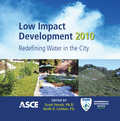Marketing for Behavior Change and Nutrient Reduction
Publication: Low Impact Development 2010: Redefining Water in the City
Abstract
Recent efforts in Minnesota have shown that targeted social marketing approaches result in broader implementation of behaviors that have measurable water quality benefits. We can take the lessons learned in successful water resource social marketing programs and apply them to broader audiences that will maximize the nutrient load reduction benefits. Social marketing science teaches that the barriers to change must be addressed before behaviors will be modified. Social norms, technical expertise, time, and financial limitations are the primary barriers for changing practices for water quality improvement. Voluntary implementation on a broad scale requires effective marketing to generate interest, increase demand, and change social norms. It is apparent that broad scale implementation will be necessary to achieve higher water quality standards and minimize impacts of runoff from urban, suburban, and rural areas. As comprehensive approaches to resource management are implemented, it is becoming apparent that intensive marketing is needed to drive demand for clean water. The Blue Thumb Program follows many social marketing strategies and helps the general public plant native gardens, raingardens and shoreline plantings. The goal of the Blue Thumb program is to address many of the barriers that currently prevent people from "planting for clean water." The message is carefully crafted to effectively reach its target audience. The program also leverages incentives to motivate people to act. Blue Thumb employs neighborhood parties as a strategy to change social norms. One party held in 2007 resulted in 22 raingardens. These twenty-two raingardens equates to approximately 11 pounds of Phosphorus reduction, which is directly attributed to the marketing, technical assistance, and incentives provided. Similar results were experienced in 2008 and 2009. Accordingly, we can document that effective marketing (when connected with a holistic incentive and technical assistance program) reduces pollutant loads. Today's presentation will discuss Social Marketing as a tool to promote LID retrofits for TMDL load reduction, review the Blue Thumb program as a model, and discuss the benefits of marketing for behavior change and load reduction on private lands. We show that effective water resource social marketing motivates and inspires landowners to implement nutrient reduction practices.
Get full access to this article
View all available purchase options and get full access to this chapter.
Information & Authors
Information
Published In
Copyright
© 2010 American Society of Civil Engineers.
History
Published online: Apr 26, 2012
Authors
Metrics & Citations
Metrics
Citations
Download citation
If you have the appropriate software installed, you can download article citation data to the citation manager of your choice. Simply select your manager software from the list below and click Download.
